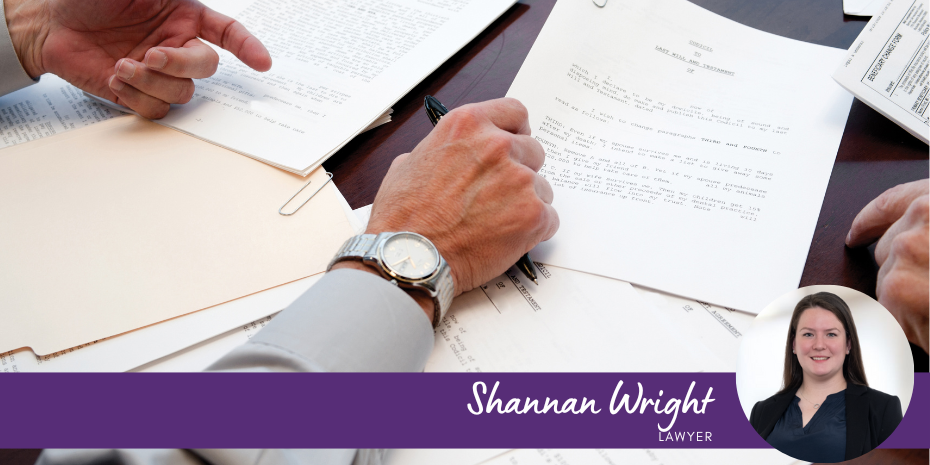KEY TAKE OUT
One limb of technicality is ensuring your Will is valid. For your Will to achieve your intentions is another kettle of fish. A well-drafted and precise Will may detail your wishes, however, if it is not finalised in accordance with the law then it may not be as steadfast as first appeared.
Admittedly, I once thought that a Will could easily be scrawled on a piece of paper, in any old fashion and be crystal clear of my wishes. To a certain extent you may write an informal Will in this roundabout way. However, this is NOT advisable! This is a dangerous path to travel, especially if specific requests and your unique family dynamics form part of the fabric which influence your wishes.
A will is a legal document, and so I believe it should be afforded the respect of being specifically drafted, formatted, and researched. It should be presented to your executors as though it was to be handed to the Supreme Court of New South Wales. It should achieve your wishes in a swift and time-effective manner for your beneficiaries and family. Without a well-structured and finely detailed document which is up to date, your assets may not be dispensed with as you had hoped! This is why we advise against the earlier approach to Will drafting; without professional advice, your Will may not take the form of a legally valid Will.
What are the Legal Requirements and What Makes a Will Valid?
Well, interestingly, each state and territory in Australia may tweak their laws ever so slightly (or drastically) when it comes to what form and substance a valid Will entail.
In New South Wales there are specific rules about the finalisation of your Will. A Will is valid in New South Wales where:
- made out by someone who is over the age of 18;
- it is in writing;
- each page is signed by the will-maker (or by a person the will-maker has directed to sign on their behalf, in their presence, if they are physically unable to sign themselves);
- it is signed in the presence of at least two witnesses, and those witnesses also sign each page of the Will.
Who is a valid witness?
Some states allow for a beneficiary to also be witnesses to the signing of a Will. This is not always the case in New South Wales! We recommend you have at least two independent witnesses present as you sign your Will and who, in turn sign also.
Why do we recommend this? Well, it removes a layer of complexity which may prolong the distribution of your estate assets, if you were to have a beneficiary witness and sign your Will. If a beneficiary did witness your will, one of the following may occur:
- There would need to be more than two witnesses signing, of which at least two witnesses must not be beneficiaries or interested parties; OR
- Written permission would need to be sought from all people who would also have benefitted from the gift that the interested witness would be gaining; OR
- The Court would be required to make a finding on whether the will-maker signed this Will freely and voluntarily given that an interested party was present at signing who may have coerced their hand.
Sounds a little complex? That’s true… and so, we always have at least two independent witnesses signing a Will drafted by our Team at Coutts.
Other Facts that you may not have known about a Will
- If a beneficiary dies within 30 days after the will-maker’s passing the will is to take effect as if the beneficiary had died immediately before the testator!
- Each time you move houses you do not need to update your address on your Will! However, if you have bought a new property as tenants in common or in your sole name, it is recommended that you do reconsider your Will so that you can make your wishes known as to what you would like to happen with your share if something happened to you.
- If a gift fails to be attained by a beneficiary, then it will form part of the rest of your estate. That is, if your gift to your beneficiary is not well enough written to explain exactly what is to be done with it, or the beneficiary fails to attain their interest and you have not advised of another person who could benefit in their place, then this piece of property will be put back into the lump sum that is the residue of your estate.
- A will is revoked by the marriage of a will-maker! (Call us to learn how your Will can be drafted to overcome this hurdle).
- This one is interesting… A minor can make a Will if it is in contemplation of marriage!! The will is of no effect if the marriage doesn’t take place.
Final thoughts
Perhaps you found one of the above listed facts interesting or you have realised that the scribble of your wishes on a serviette at a rest stop might be a recipe for a disaster? If anything, I hope by reading this blog you have walked away with a new piece of information that can form a topic around your dinner table tonight or has inspired you to get your estate planning in order.
For further information please don’t hesitate to contact:
Contact our Campbelltown Lawyers today.
This blog is merely general and non specific information on the subject matter and is not and should not be considered or relied on as legal advice. Coutts is not responsible for any cost, expense, loss or liability whatsoever in relation to this blog, including all or any reliance on this blog or use or application of this blog by you.



